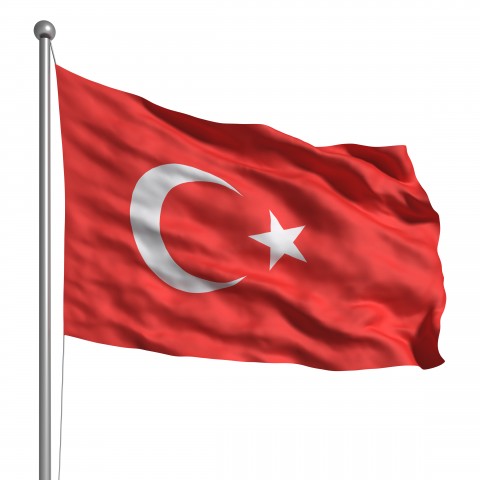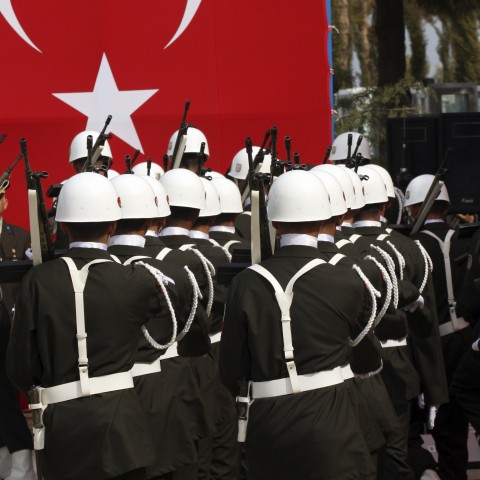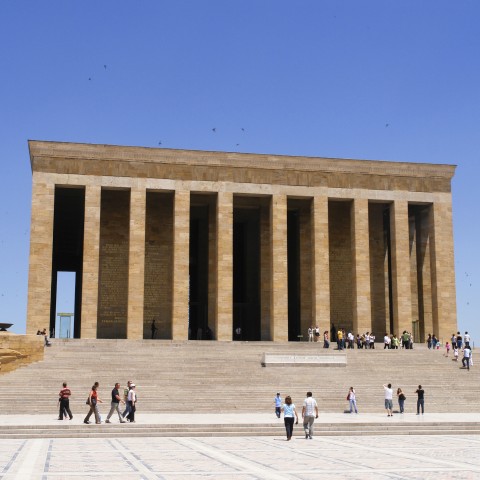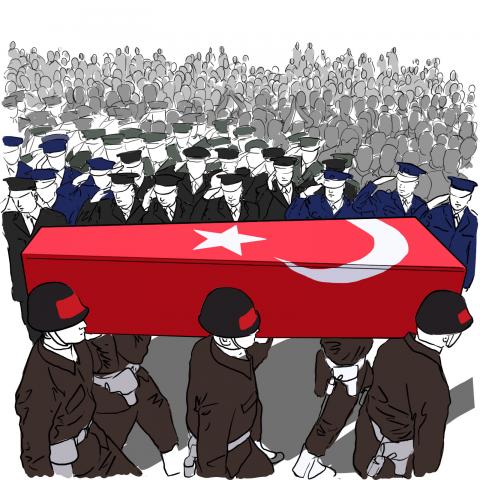
Flags and national anthems are the two most important tokens of the representation of national identities. However, since national anthems consist of lyrics and music, it’s a little more effective in getting the feelings across. The lyrics usually express a country’s power, independence, and patriotic sentiments, which touch people’s hearts deeply. Furthermore, with the help of music and the act of singing, the nation becomes as one heart, which beats as one together.
Every national anthem is unique and has its own story behind it. Would you like to know the history of the Turkish national anthem? What is the national anthem of Turkey called? How about learning the Turkish national anthem’s lyrics in English?
 Table of Contents
Table of Contents
- Vocabulary Relevant to National Anthems
- History of Turkish National Anthem – ‘İstiklal Marşı’
- Lyrics of İstiklal Marşı
- Where, When, and How is the Turkish National Anthem Sung?
- All about Turkish Language and Turkish Culture
1. Vocabulary Relevant to National Anthems
| Turkish | English |
| Milli | “National” |
| Marş | “March” |
| Bayrak | “Flag” |
| Saygı | “Respect” |
| Ceremony | “Tören” |
| Geçit töreni | “Parade” |
| Vatansever | “Patriot” |
| Vatanseverlik | “Patriotism” |
| Official | “Resmi” |
| Güfte/söz | “Lyrics” |
| Orkestrasyon | “Orchestration” |
| Beste | “Composition” |
2. History of Turkish National Anthem – ‘İstiklal Marşı’
1. Content and the origin of content
Turkish history goes back thousands of years, and the rule of theOttoman Empire is a significant period. Upon the defeat of the Ottoman Empire at the end of World War 1, some regions of the Ottoman Empire were occupied by other countries. In 1919, the War of Independence was started to ensure and protect the integrity of the country. This war ended successfully in 1923 and led to the establishment of the Republic of Turkey.
In 1921, it was announced in the nation that an original National March was going to be selected and awarded in a competition. The aim was to motivate the battling military forces and to encourage and honor the whole nation for an independent land at the end of the war.
724 poems took part in the competition. However, none of them were found to be suitable as a National March.
It was realized that Mehmet Akif Ersoy, who was a famous poet at that time, hadn’t participated in the competition. He hadn’t sent a poem because he disapproved of the fact that there was a monetary reward for the winner.
The National Parliament convinced him to write and present a poem and ignore the prize. Finally, he sent his poem, which consisted of 10 verses. He expressed his confidence in the courage and self-sacrifice of the Turkish soldiers and the Turkish nation’s commitment to independence, God, homeland, and religion in this poem. He was, basically, referring to the Turkish War of independence.
2. Adoption and the lyricist
Mehmet Akif Ersoy’s poem, which was titled İstiklal Marşı (“Independence March”), was adopted as the Turkish National Anthem on March 12th, 1921, before the establishment of the Turkish Republic.
Do you know what happened to the reward he was entitled to? It was donated to a foundation, which provided poor women and children with new skills so that they could find jobs and make some money.
3. Composer and Orchestrator
After the adoption of the lyrics, there was a Turkish national anthem composer competition for the musical composition of the poem. 24 composers participated in this competition. However, due to the war in the country, there was no time to evaluate the results. Therefore, the poem was sung differently in the country’s different regions.
In 1924, Ali Rıfat Çağatay’s composition was selected. His music was used until 1930. Then, the composition, prepared in 1922 by Osman Zeki Üngör, the conductor of the Presidential Symphony Orchestra, started being used. However, it’s claimed that this music was composed for some other lyrics, not for the İstiklal Marşı.Later on, it was orchestrated by Edgar Manas.

3. Lyrics of İstiklal Marşı
İstiklal Marşı consists of 10 verses. Only verses 1 and 2 are sung as the National Anthem!
Please note that the words “the star and the crescent,” which are mentioned a few times in the poem, represent the star and the crescent on the Turkish flag.

Below, you can find the Turkish national anthem in English. Please note that the Ministry of Foreign Affairs of Turkey has translated the first two verses below. The remaining 8 verses below have been translated by Assoc. Prof. Dr. Günil Özlem Ayaydın Cebe.
| 1 | Korkma, sönmez bu şafaklarda yüzen al sancak; Sönmeden yurdumun üstünde tüten en son ocak. O benim milletimin yıldızıdır, parlayacak; O benimdir, o benim milletimindir ancak. | Fear not, the crimson flag, waving in these dawns will never fade Before the last hearth that is burning in my nation vanishes. That is my nation’s star, it will shine; That is mine, it belongs solely to my nation. |
| 2 | Çatma, kurban olayım çehreni ey nazlı hilâl! Kahraman ırkıma bir gül… ne bu şiddet bu celâl? Sana olmaz dökülen kanlarımız sonra helâl, Hakkıdır, Hakk’a tapan, milletimin istiklâl. | Oh coy crescent, do not frown for I am ready to sacrifice myself for you! Please smile upon my heroic nation, why that anger, why that rage? If you frown, our blood shed for you will not be worthy. Freedom is the right of my nation who worships God and seeks what is right. |
| 3 | Ben ezelden beridir hür yaşadım, hür yaşarım. Hangi çılgın bana zincir vuracakmış? Şaşarım! Kükremiş sel gibiyim; bendimi çiğner, aşarım; Yırtarım dağları, enginlere sığmam, taşarım. | I have been free since eternity, and free shall I be. What fool dares to shackle me? I defy the temerity! I am like a roaring flood; I overflow trampling down my banks, I tear apart mountains, surge into depths, and surpass. |
| 4 | Garb’ın âfâkını sarmışsa çelik zırhlı duvar; Benim iman dolu göğsüm gibi serhaddim var. Ulusun, korkma! Nasıl böyle bir îmânı boğar, “Medeniyet!” dediğin tek dişi kalmış canavar? | Western horizons may be encircled by walls armored in steel But I have my chest brimful of faith as my homeland’s frontier. Let it howl, fear not! How can it smother such solid faith That single-fanged monster, “Civilization!” as you call it? |
| 5 | Arkadaş! Yurduma alçakları uğratma sakın; Siper et gövdeni, dursun bu hayâsızca akın. Doğacaktır sana va’dettiği günler Hakk’ın… Kim bilir, belki yarın… belki yarından da yakın. | My friend! Never ever let the dastards into my land! Render your body a shield; bring this heinous raid to an end. For soon shall break the blissful days God promised, for sure; Perhaps tomorrow, who knows, perhaps even sooner than that. |
| 6 | Bastığın yerleri “toprak!” diyerek geçme, tanı! Düşün altındaki binlerce kefensiz yatanı. Sen şehîd oğlusun, incitme, yazıktır atanı; Verme, dünyâları alsan da, bu cennet vatanı | Do not assume what you tread on is mere “earth”, recognize it! Think of the thousands, without shrouds, lying beneath. You’re the son of a martyr, take shame, hurt not your ancestor; Cede not this heavenly homeland, even if it’s the worlds you’re granted. |
| 7 | Kim bu cennet vatanın uğruna olmaz ki fedâ? Şühedâ fışkıracak, toprağı sıksan şühedâ! Cânı, cânânı, bütün varımı alsın da Hudâ, Etmesin tek vatanımdan beni dünyâda cüdâ | Who would not offer his life for this homeland of paradise? Martyrs would pour forth, all martyrs, should one simply clutch the earth! If God will, He may take my life, my beloved, and my wealth, But may He not, for the world, just deprive me of my homeland. |
| 8 | Ruhumun senden, İlâhî, şudur ancak emeli: Değmesin ma’bedimin göğsüne nâ-mahrem eli! Bu ezanlar-ki şehâdetleri dînin temeli Ebedî yurdumun üstünde benim inlemeli | The sole wish of my soul, oh glorious God, from You is that, No heathen would ever, on the bosom of my temple, lay hand! These calls to prayer, whose testimonies are the ground of religion, Should resound far and wide over my eternal homeland. |
| 9 | O zaman vecd ile bin secde eder –varsa- taşım; Her cerîhamdan, İlâhî, boşanıp kanlı yaşım, Fışkırır rûh-i mücerred gibi yerden na’şım; O zaman yükselerek Arş’a değer, belki başım. | Then, my tombstone, if any, prostrates in rapture a thousand-fold, Of my every wound, oh glorious God, tears of blood gush forth, And out spurts my corpse, in pure spirit, from the ground, Perhaps then, shall ascend and to the heavens touch my crown! |
| 10 | Dalgalan sen de şafaklar gibi ey şanlı hilâl; Olsun artık dökülen kanlarımın hepsi helâl. Ebediyen sana yok, ırkıma yok izmihlâl: Hakkıdır, hür yaşamış bayrağımın hürriyet; Hakkıdır, Hakk’a tapan milletimin istiklâl! | So ripple and wave, like dawning skies, oh glorious crescent, So that every drop of my blood finally be blessed and worthy! Neither you nor my race shall ever be annihilated, For my flag, who has lived ever freely, has the right to liberty; For my nation, who worships God, has the right to independence! |
4. Where, When, and How is the Turkish National Anthem Sung?
1. Occasions
There is more to know about the Turkish national anthem. Let’s see when and where it’s played and sung.
1. At the beginning of the ceremonies of the official holidays,
2. At the welcoming and farewell ceremonies of the presidents of other countries,
3. At the welcoming and farewell ceremonies of the high-ranking commanders,
4. At the flag hoisting and lowering ceremonies,
5. In the reception of foreign ambassadors and other diplomats,
6. At the beginning of the ceremonies held in military units, schools, and institutions,

7. In special ceremonies where the president of the Turkish Republic will be present,
8. At the start and end times of radio and television broadcasts,
9. At the beginning of the association board meetings,
10. At the flag ceremonies held in schools (Every Monday morning and Friday afternoons and on special days),
11. At the military oath of enlistments,
12. In the visits of the statesmen to Anıtkabir (Ataturk‘s monumental tomb) and in other cases Anıtkabir visits,

13. At medal ceremonies,
14. In international sports games,
15. In the farewell of martyrs,

16. At state ceremonies,
17. In sports games,
18. In oath ceremonies and other ceremonies of military schools, unions and institutions,
19. Before the ceremonies and meetings of various parties, associations and organizations, etc.
2. National Anthem Etiquette in Turkey
Every country has its own national anthem etiquette. Here is what you should and shouldn’t do when the Turkish anthem is played:
1. Everyone must stop.
2. Everyone must stand up.
3. Everyone must stand at attention. (Straight, with feet together and arms by the sides)
4. Civilians have to take their hats off.
5. No eating, no talking, and no moving around during the march.
6. It must be sung in a respectful way.
One more piece of extra information about the Turkish anthem:
The lyrics of the Turkish national anthem, the Turkish flag, and the picture of Ataturk, the founder of the Turkish Republic, are framed and hung on the walls of every classroom in Turkey.
5. All about Turkish Language and Turkish Culture
In this article, you found out the answer to the question: “What is the name of the national anthem of Turkey?” Then you learned other facts about the Turkish national anthem, such as the Turkish national anthem’s lyrics in English, the history of the Turkish national anthem, the Turkish national anthem’s composer, and the national anthem etiquette in Turkey, etc. However, there is a lot more to know about Turkish culture and the Turkish language.
Therefore, visit TurkishClass101, which has numerous audio recordings, tons of vocabulary lists, and free resources, including the dictionary you can refer to, to get a better grasp of the Turkish language and its culture.
Don’t forget that there is also MyTeacher, which is the premium service of TurkishClass101 that you can use to practice with a private teacher.
Do you know what is also good about it? You can download the app for free and use it wherever you are.
Last but not the least, please continue to provide us feedback about all the resources provided at TurkishClass101!








